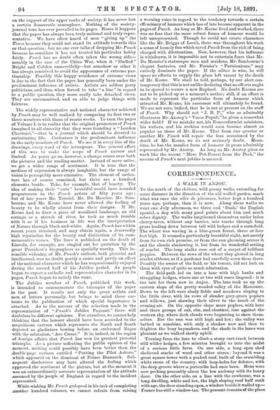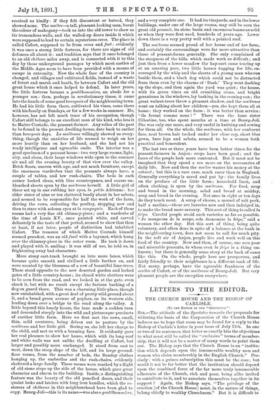CORRESPONDENCE.
A WALK IN. ANJOU.
To the north of the chciteau, wild grassy walks, extending for- some distance in the direction of the old walled garden, mark what was once the (Inge de plaisance, better kept a hundred years ago, perhaps, than it is now. Along these walks we went one. July afternoon, we three and '.Dash,' the English spaniel, a dog with many good points about him and much sober dignity. The walks lengthened themselves under laden cherry-trees, without any barrier, into tracks through long grass leading down between tall wild hedges and a corn-field. The wheat was waving in a blue-green forest, three or four feet high. It seemed a particularly beautiful sight, not merely from its own rich promise, or from the sun gleaming across it and the clouds shadowing it, but from its wonderful setting of scarlet. The long stalks rose out of a carpet of brilliant poppies. Between the rows of the wheat they glowed in long scarlet ribbons, as if a gardener had carefully sown them there.. Possibly the owner of the field, or his tenant, did not look on them with eyes of quite so much admiration.
The field-path led on into a lane with high banks and straggling hedges, where one or two wild roses lingered : it is too late for them now in Anjou. The lane took us up the eastern slope of the pretty wooded valley of the Marconne. Down to the left were shady fields and meadows sloping to the little river, with its rows of slender grey-green poplars and willows, just showing their silver to• the touch .of the- evening air. On the opposite slope more poplars, with here and there groups of oak, elm, and chestnut, rose against the western, sky, where dark clouds were beginning to show them- selves. But the sun was still high and hot ; the valley was bathed in sunshine, with only a shadow now .and then to frighten the busy haymakers, and the shade in the, lanes was pleasant as we walked slowly uphill.
Turning from the lane to climb a stony cart-track between still wilder hedges, a few minutes brought us into the midst. of a curious little farm. On one side, a long open shed sheltered stacks of wood and other stores : beyond it was a great square tower with a peaked roof, built of the crumbling white stone of the country, with loop-holes for defence, with the.deep groove where a portcullis had once been. Hens were now pecking peaceably about the low archway with its heavy door. On the other side, on a line with the cowhouse, was a. long dwelling, white and low, the high sloping roof half sunk with age, the door standing open, a window beside it walled up— France has still a window-tax. The peasant-tenants of the place received us kindly : if they felt discontent or hatred, they showed none. The maitre—a tall, pleasant-looking man, burnt the colour of mahogany—took us into the old tower to show us its tremendous walls, and the walled-up doors inside it which were supposed to lead to certain mysterious caves. The place is called Cafort, supposed to be from caves and fort : evidently it was once a strong little fortress, for there are signs of old defences all about it : and tradition says that it once belonged to an old chateau miles away, and is connected with it to this day by those underground passages by which most castles of the Middle Ages seem to have been provided with a means of escape in extremity. Now the whole face of the country is changed, and villages and cultivated fields, instead of a waste of forest and marsh and heath, lie between Cafort and the old great house which it once helped to defend. In later years, the little fortress became a gentilhommiere, an abode for a younger son : then, perhaps in revolutionary times, it came into the hands of some good bourgeois of the neighbouring town. He had his little farm there, cultivated his vines, came there with his family on Sundays, or for a few weeks in summer. He, however, has not left much trace of his occupation, though Cafort still belongs to an excellent man of his kind, who lets it to Maitre Coutade, the peasant-farmer. Any relics of the past to be found in the present dwelling-house, date back to earlier than bourgeois days. La maitresse willingly showed us every- thing, though the anxieties of life seemed to weigh on her snore heavily than on her husband, and she had not his ready intelligence and agreeable smile. The interior was a good specimen of a peasant house : two very large rooms, light, airy, and clean, their large windows wide open to the summer air and all the evening beauty of that view over the valley. Brick floors, uneven with age, and not much furniture, except the enormous wardrobes -that the peasants always have, a -couple of tables, and low rush-chairs. The beds in each corner looked clean, with blue counterpanes, and coarse un- bleached sheets spun by the maitresse herself. A little girl of three sat up in one rubbing her eyes, la petite Adrienne : her elder sister of nine or ten clattered busily about in her sabots, and seemed to be responsible for half the work of the farm, driving the cows, collecting the poultry, stopping now and then to stare with solemn eyes at la compagnie. Each of these rooms had a very fine old chimney-piece; and a wardrobe of the time of Louis XV., once painted white, and carved delicately in the taste of that period, seemed to show that then at least, if not later, people of distinction had inhabited Cafort. The treasure of which Maitre Coutade himself seemed proudest, was an old fusil with a bayonet, which hung over the chimney-piece in the outer room. He took it down and played with it, smiling : it was still of use, he told us, in frightening away bad characters.
More stony cart-track brought us into more lanes, which became quite smooth and civilised a little further on, and were scented by the blossoms of a row of beautiful lime-trees. These stood opposite to the now deserted garden and locked gates of a little country-house ; its closed white shutters were to be seen from the road, and we looked in at the gate, even shook it, but with no result except the farious barking of a dog on guard there. This was a charming little place, though now uninhabited, with a great deal of pretty wild ground about it, and a broad green avenue of poplars, on its western side, leading down over a bridge to the road along the valley. A little beyond this lonely house, the lane made a sudden turn and descended steeply into the wild and picturesque precincts of another little farm. Here we first met the cows, small, thin,, mild creatures, being driven out to pasture by the maitresse and her little girl. Seeing us, she left her charge to the child, and met us with a beaming face. It evidently gave her real pleasure to show her house, which with its long roof and white walls was not unlike the dwelling at Cafort, but larger and possibly more unchanged. It stood from east to west, down the steep slope of the bill, and its large ground- floor rooms, from the number of beds, the Sunday clothes hanging up, the umbrellas and the rush-chairs, evidently sheltered a large family. These rooms were reached by a flight of old stone steps up the side of the house, which gave great character and charm to the building. Inside, a distinguishing feature was the beauty of the old panelled doors, and their .quaint locks and latches with long iron handles, which the re- storers of chateaux in this neighbourhood have been glad to copy. Bourg-Joli—this is its name—was also a gentilhbmmiere,
and a very complete one. It had its vineyards, and in the lower buildings, under one of the large rooms, may still be seen the great old pressoir, its stone basin and enormous beams as solid as when they were first used, hundreds of years ago. Lower down there is a very pretty well with a pointed roof.
The maitresse seemed proud of her house and of her farm, and certainly the surroundings were far more attractive than those of peasant-farms generally. She only complained of the steepness of the hills, which made work so difficult ; and just then from a lower meadow the hay-cart came tearing up at an amazing pace, two little horses tugging for life, en- couraged by the whip and the shouts of a young man who ran beside them, and a black dog which could not be distracted from them even by the charms of Dash.' They went dashing up the slope, and then again the yard was quiet ; the house, with its green vines on old crumbling stone, and bright geraniums in the windows, lay basking in the evening sun ; the great walnut-trees threw a pleasant shadow, and the maitresse went on talking about her children—yes, she kept them all at home : they worked on the farm : it was better than service : "fls feront comme nous ! " There was the lame sister Celestine, too, who spent months at a time at Bonrg-Joli. She was only one more, and very useful in knitting and sewing for them all. On the whole, the maitresse, with her sunburnt face, neat brown hair tucked under her close cap, short blue gown, bare legs and sabots, seemed to be a woman both practical and benevolent.
The last two or three years have been better times for the peasant-farmers in Anjou : crops have been good ; and the faces of the people look more contented. But it must not be imagined that they spend a sou more on the necessaries of daily life. Now and then the maitre wastes his money at the cabaret ; but this is a rare case, much rarer than in England. Generally everything is saved and put by : the family lives on the produce of the little farm ; household linen, and often clothing, is spun by the maitresse. For food, soup and bread in the morning, salad and bread at midday, soup and bread in the evening. Not once in eight or ten days do they touch meat. A scrap of cheese, a morsel of salt pork, half a sardine,—these are luxuries now and then indulged in, to make the bread more savoury. This sort of thing is called la fripe. Careful people avoid such varieties as far as possible. " Je mangeons de la soupe, vela economise la fripe," said a woman the other day. But this sort of thing, being quite voluntary, and often done in spite of a balance at the bank in the neighbouring town, does not seem to call for much pity. In the soft air of Anjou, people live and work well on this food of the country. Now and then, of course, one sees poor and miserable peasants, to whom even la fripe is a thing un- known ; but there is generally some story at the back of cases like this. On the whole, people here are prosperous, and fairly friendly to their neighbours in a different rank of life. Not many, perhaps, have the agreeable frankness of the maitre of Cafort, or of the maitresse of Bonrg-Joli. But very pleasant people are the exception everywhere.



















































 Previous page
Previous page